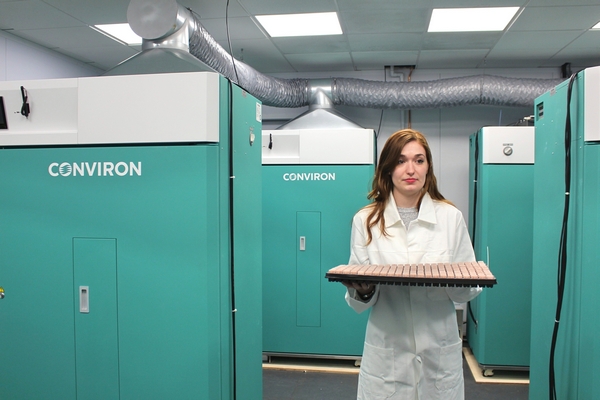UK based Light Science Technologies (LST), has opened its new, state-of-the-art in-house laboratory as it aims to help growers create the most optimal plant recipe.
The purpose-built testing facility at LST’s Derby site will mimic, via a test and replicate process, a grower’s closed indoor environment and test new crops in its controlled environment chambers managing temperature, humidity and CO2. By running up to 12 concurrent trials in 6 chambers, a team including in-house scientists and top-level industry experts will harness historical and real-time data to help farmers and growers create the right recipe.
The opening of the laboratory demonstrates our full commitment to the ‘art’ of plant science. It will help accelerate the development of horticulture lighting and environmental technologies over the next few years. And, beyond as we seek out more sustainable, energy-efficient ways of farming. Simon Deacon, CEO, Light Science Technologies
Deacon continues: “Our testing facility provides a multi-faceted solution with potential for controlled environment agriculture (CEA) farmers and the industry at large. Not just recipe development for higher density and profit margin crops, but a pathway to industry-leading scientists in different plant species. And, equally importantly, an opportunity to prototype new crops before investment.”
Utilizing its Conviron 2000 litre reach-in plant grow chambers along with its integrated, fully updateable, and bespoke lighting solutions, LST’s lab offers multiple benefits to growers while helping them achieve the optimal yield, including lowering CAPEX and OPEX costs.
By harnessing advanced lighting technology, LST’s lighting systems can identify the right spectral waveforms and PPFD levels required for any species of plant or microbiology and can validate the performance of a grower’s existing set-up or compare new solutions independently, using its own Quantum PAR Photo-Goniometer testing facility. Built inside a 22-meter bespoke light tunnel using its 2021 SSL Spectral Photo Goniometer, it can accurately measure PAR (400nm-700nm) Quantum PAR (250nm-1040nm), and CIE.
The lab’s capabilities also mean it can measure plant health thanks to the LIcor LI-6800, the only photosynthesis system capable of measuring combined gas exchange and fluorescence from leaves and aquatic samples in just a few seconds with the highest level of accuracy and detail. It also instantly details temperature and humidity.
Other key elements include advanced water and environmental testing, used to help growers identify the macronutrients in their plants and check for all types of food safety, quality, and chemical contamination. And, to ensure only plant performance data is collected, GrowFoam, a natural biodegradable growing medium that has no effect on the plant, will be used in the Conviron plant growth chambers.
One of the most interesting aspects of the lab is the focus on developing an AI capable of monitoring and proactively controlling environmental parameters and plant performance. This is done by leveraging LST’s partnership with a number of universities and its work using an in-house Big Data resource. Using the latest stacked GPGPU technology, data can be brought to life to increase plant performance, taste control, and quality.
For more information:
Conviron
conviron.com










